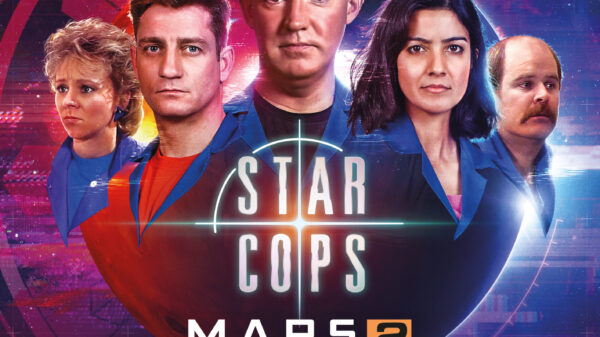The guiding principle of Star Cops, which continues to make the series so effective on audio, is that it should always be a police procedural which just happens to unfold in space. This latest trilogy of investigative adventures from Big Finish, which concludes the current series of adventures based on the planet Mars, embraces that storytelling imperative very successfully.
The International Space Police Force are eager to make the case that the new colonies on Mars need a system of law enforcement to maintain order and deal with crime. But the network of scattered settlements and private commercial interests that have built a planetary bridgehead on Mars are sceptical about the idea of diluting their autonomy in return for security. Mars has already proved to be a baptism of fire for the Star Cops, and, given the criminality that they uncover, there’s plenty of opportunity for them to prove their worth
Fully embedded
The narrative rather cleverly jumps around in the established timeline, giving a different and revealing perspective on events listeners have previously heard. The significance of story elements that were quietly seeded in earlier episodes is now revealed. The criminal conspiracy that confronts Commander Nathan Spring and his colleagues on the Red Planet is intriguing and unexpected. Yet the story works so well because all three scripts focus on the unfolding investigation free from additional clutter or the unnecessary distraction of side stories. There is a directness and a drive to the storytelling, that keeps things focused and moving forward.
None of which means that characterisation, or interaction between team members, is overlooked. Across the three tales, the original trio of leading characters are well served. Nathan is driven, self-motivated and principled, determined to pursue wrong-doing and make the case for the cops’ presence on Mars. David Calder is again in his element, voicing the part with astute conviction. Linda Newton is just as assured as the feisty Pal Kenzy, while Trevor Cooper makes the most of some great dialogue as the boorish but always likeable Colin Devis. Now that Rakhee Thakrar’s Priya Basu and Philip Olivier’s Paul Bailey have battled side-by-side with their new colleagues through many life-and-death deep space crises, they now convince as proven members of Spring’s crime fighting team.
Undercover mission
Andrew Smith’s “Bodies of Evidence” begins with a shuttle crash on the surface of the Moon, shortly before Nathan, Kenzy and Devis are due to depart for Mars. After some explosive set-pieces, Priya discovers dismembered body parts amidst the wreckage of the crash site. But the Star Cops are warned off by the enforcers of the ship’s owners Lachman Research and Innovation. Incensed, and in defiance of the direct orders of his bosses, Spring approves an undercover mission on Mars to find answers. Prya’s and Paul’s clandestine investigation requires the support of Professor Amy Bell. She’s soon worried by the risks to her own Mars project of providing cover for the Star Cops. Unbeknownst to their colleagues, this secret initiative saves lives, but the endeavour quickly draws the suspicions of an influential Mars businessman.
With all of Spring’s team now planet-side, director Helen Goldwyn’s “Human Kind” is able to craft her Mars-based story as a genuine ensemble piece. Loyalties come under strain, hidden secrets surface and sacrifices have to be made. The adventure and the conspiracy elements of Goldwyn’s story are both well crafted, and the script makes good use of the opportunity to ratchet up the tension and raise the stakes ahead of the finale. With his officers all committed in the field, Spring is left alone to make the case for an International Space Police Force presence on Mars to a hard-to-impress audience of settlers.
Criminal enterprise
Throughout the Mars story the drive of unregulated frontier capitalism has become increasingly entangled with criminal enterprise. Spring’s attempt to convince the colonists that due process under the law will not lead to tyranny or the abuse of power is powerfully written by Goldwyn and expertly performed by Calder.
Smith returns to scriptwriting duties to pen the stirring finale “The Highest Ground”. Olympus Mons, the massive “shield volcano” on the planet’s surface, has been a recurring landmark throughout these Mars adventures. It’s entirely fitting that it should provide the huge scale setting for a decisive high-stakes showdown, from which not everyone will emerge alive or unscathed.
The thrilling conclusion of the Mars story secures the stellar status of Star Cops on audio. This is an assured and faithful adaptation of a small-screen sci-fi property able to build on the concept’s strengths. There’s no risk either of the show’s credibility falling victim to a shoestring special effects and visual design budget: an unfortunate fate that has led so many high-concept science fiction TV shows from that era to age so visibly. Several of Big Finish’s more recent genre TV adaptations have been lost to cancellation. On the strength of Mars Part 2, let’s hope there’s no reason to arrest the Star Cops.
![]()
Star Cops: Mars Part 2 is available, in CD and digital download formats from the Big Finish site.

